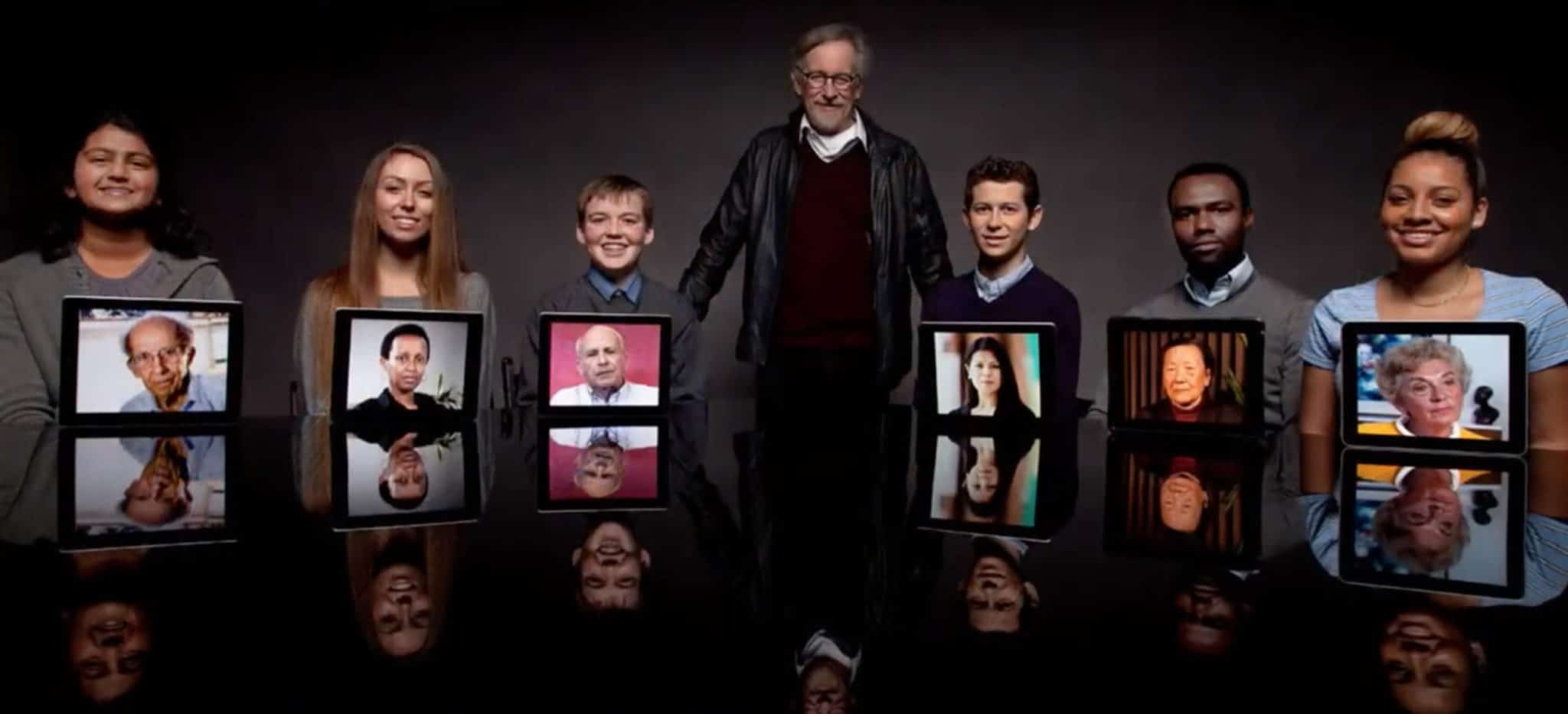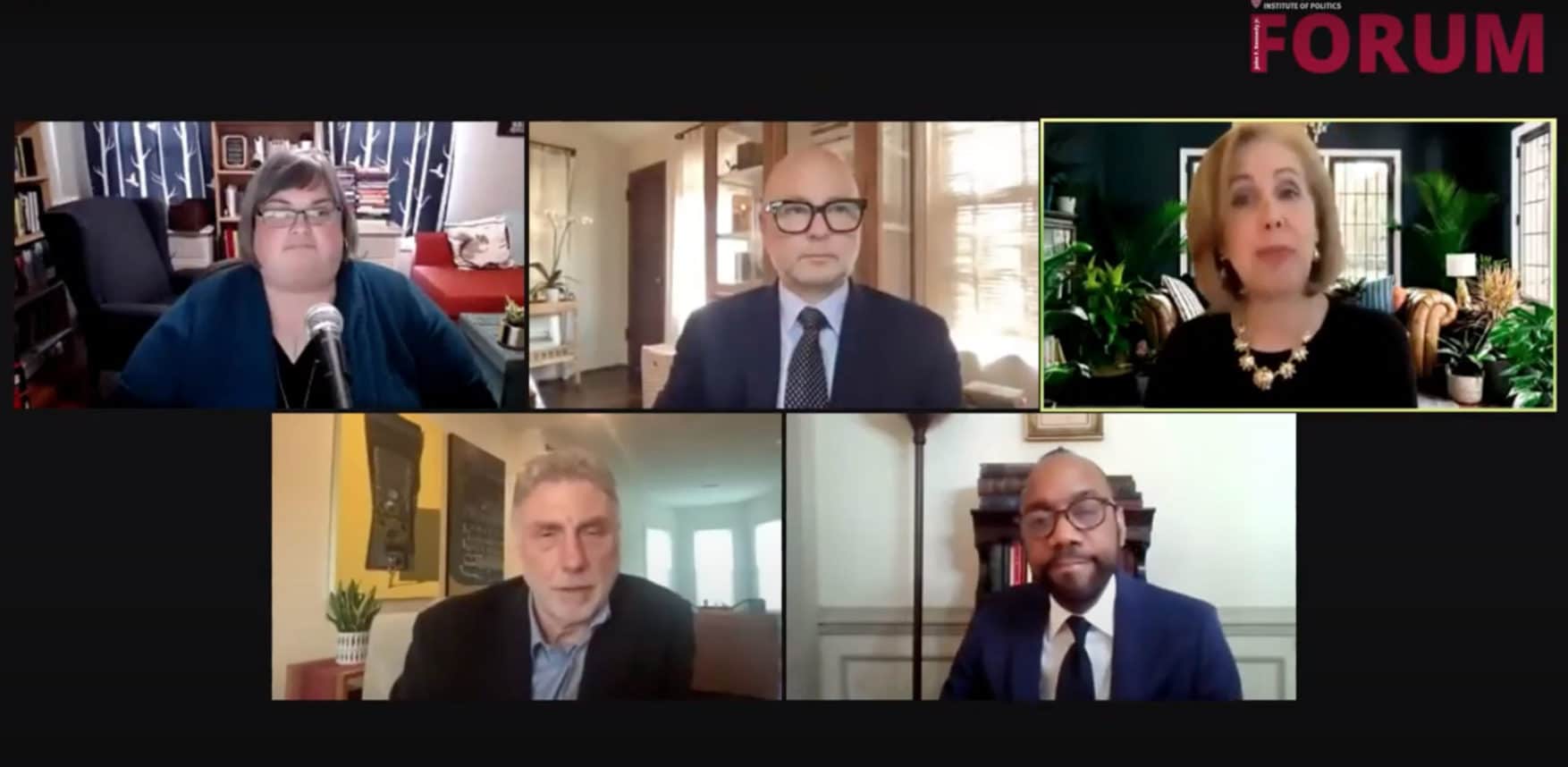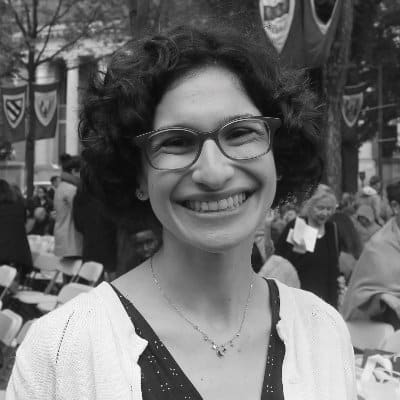 Screenshot from YouTube video
Screenshot from YouTube video In listening to the testimonies of those who have endured unspeakable tragedies, “we become emissaries and ambassadors to other communities.” That was the key takeaway from “What is stronger than hate? Lessons from testimony, media, and scholarship,” an event hosted by the Shorenstein Center on Media, Politics and Public Policy at Harvard Kennedy School and the USC Shoah Foundation. The April 27 event was initiated to celebrate Harvard making the Shoah Foundation’s visual history archive available to its community.
The event began with the audio testimony of Ruth Bacow, mother of the current Harvard University President Lawrence S. Bacow, describing her experiences in a Nazi concentration camp. Despite watching the smoke from the crematoria every time she used the bathroom, Ruth was “was very optimistic” that she would survive. And she did. But she was the only Jew in her town to do so.
Bacow’s testimony is now part of the USC Shoah Foundation’s Visual History Archive, where it joins over 56,000 survivor testimonies. President Bacow was “extraordinarily grateful” for the archive, adding that his testimony now joins the archives, too. USC President Carol Folt also provided remarks, and she and Bacow emphasized that the testimonies are more important than ever in the fight against hate and disinformation.
The founder of the Shoah Foundation, director Steven Spielberg, joined the call and celebrated the event. “It’s the sharing of these stories with the world that allows our work to have the lasting impact” that Spielberg dreamed of when he created the foundation. “I know that the entire Harvard community is going to benefit from this incredible archive.”
The event featured a panel including Marty Baron, former executive editor of The Washington Post; Cornell William Brooks, former president & CEO of the NAACP; Joan Donovan, research director of the Shorenstein Center; and Stephen Smith, executive director of USC Shoah Foundation and Jewish Journal contributor. Nancy Gibbs, director of the Shorenstein Center, moderated the panel.

Brooks outlined the necessity of using the archives to study hate. He explained that the Nazis were inspired by American racist laws in creating their legal systems. We can use history to combat and understand hate, he argued, pointing to the “only two organizations” that are 100 years old in America that were born of lynching — the Anti-Defamation League and NAACP — as evidence that “we have yoked history, yoked tragedy.”
The stakes for teaching this history are high, Brooks added, noting that there are generations that “can’t name a death camp.” Harvard has a “moral responsibility to teach” history and develop new ways to combat hate, he concluded. “Those 56,000 voices not only represent an archive of the past, they represent a repository in the present.”
But Gibbs asked what happens when today’s teachers — journalists — see facts lose their salience in defining the truth. Baron noted that journalists try to lay out all the information and facts, but even then, people can deny the truth. Although you can’t get through to everyone, he argued, “a substantial majority of people understand what the facts are.” The goal is making sure they “prevail” in setting policy.
Part of combatting disinformation and hate, however, lies with the social media platforms that often spread those messages. Smith explained the role Facebook and other social media companies played in weaponizing hate against the Rohingya in Myanmar. Although the Rohingya had devices, they weren’t able to secure social media accounts to see and respond to the hate weaponized against them; instead, they took photographs of atrocities. Smith argued that the lesson is “we can’t wait for disaster to happen… when we have the tools at our disposal.”
“We can’t wait for disaster to happen… when we have the tools at our disposal.”
Smith asserted that social media companies must assess how their platforms can be used against vulnerable populations. Donovan added that reforms to social media have been slow because members of the Senate and social media companies do not even “know what they have built”; they don’t have the “metaphors” to describe it. “If Facebook had done more to model the networks of antisemites, especially in 2016/2017,” she argued, they would have learned how those communities “evade these systems” and “speak in code.”
Brooks highlighted the power of social media to fight hate. He pointed to the protests over the murder of George Floyd — largely due to a video on social media. That video had a direct link to the photo of Emmett Till’s mutilated body in 1955 in “animating civil rights movements.” It’s not enough to surround people with information, Brooks argued. We need to engage in “storytelling,” take advantage of new platforms and interpret history to enable us to take on broader narratives of hate.
As an example, Brooks explained how he took a class with Elie Wiesel; that experience not only opened his eyes to understanding the Holocaust, but it also allowed him to better understand slave narratives and expanded his “own understanding of tragedy.” Sharing these stories is one way of “creating the empathy, [creating] the agency, [creating] the resilience that allows us to mount social justice movements against hate.”
The panelists concluded by sharing what they were optimistic about in combatting and learning about hate. Smith expressed excitement about using blockchain and encryption to preserve footage and prevent it from being altered. Baron was encouraged by media literacy education. Donovan looked forward to a “public interest internet” with an infrastructure that allowed people searching “COVID-19” or “voting” to find reliable information first. Brooks was eager to use history to expand agency and end hate.
You can watch the full event below.
Ari Berman is Op-Ed Editor for the Journal.





















 More news and opinions than at a Shabbat dinner, right in your inbox.
More news and opinions than at a Shabbat dinner, right in your inbox.